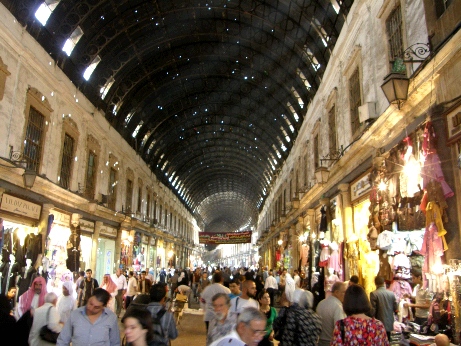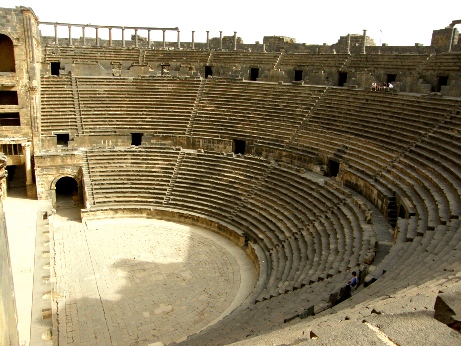Visiting Syria
From Aswan we flew to Damascus in Syria. Possibly our good impression was as much as anything as a result of finding ourselves in a place where the locals did not spend a lot of time trying to take advantage of us and where on the whole they were friendly and businesslike; where the restaurants and cafés were well appointed, pleasant and good value; people seem happy and relatively prosperous; and where the layers of numerous civilisations and religions are still very evident throughout the old city. We had booked a middle range hotel on-line. This was near the central post office and the not operating central station; midway between the craft souq and museum and the old city. It was adequate.
We both enjoyed the city that has layer upon layer of history still evident at every turn and has excellent shopping opportunities. Highlights include the souqs in the old city that run for miles; some truly excellent restaurants; the Ommayad Mosque built in 705 CE when Damascus was the capital of the Arab Islamic Empire; Roman wall, arches and columns still standing; the grand home or palace of the Azem clan when the patriarch was Governor of Damascus in the eighteenth century, complete with Harem, fountains and rich appointments; and of course the citadel, mentioned earlier.

The main Souq in Damascus - Souq Midhat Basha
There is a substantial Coptic Christian minority and several Christian churches including an interesting chapel known as St Paul's church. Paul famously fled and hid here and changed his name from Saul of Tarsus. It was from here that he, with the author of John, set about formalising the Christian religion to distinguish it from a sect within Judaism; and set it on its path to becoming the official Roman religion. The rest is history.
From Damascus we made a day trip by bus to Bosra where there is a world heritage site. This comprises a medieval citadel, complete with moat, built entirely around a Roman theatre and extensive ruins of the old Roman town nearby.

Theatre inside the Bosra Citadel
We can thoroughly recommend Syria*. It is not on the main Australian or US tourist agenda but it attracts a lot of European tourists.
*Jan 2016 Addendum:
We can't recommend a holiday in Syria anymore. Syria is now one of the most dangerous places on the planet.
I suppose that the flaring of sectarian violence should not come as such a surprise. European Christians fought amongst themselves for four centuries, burning opposing theologians and believers at the stake and killing millions, ostensibly over the authority of the Bishop of Rome and 'transubstantiation of the host'; but really over the reins of power.
Similarly, sectarian differences are being exploited in Syria in an attempt to grasp the reins of power.
As I mentioned in the introduction to this article (above), in 2010 Syria had many of the features of a police state having been under Emergency Law since 1962 and pictures of the President, Bashar al-Assad were everywhere (like Big Brother in Orwell's 1984). Although there was a referendum for President there was only one party (the Ba'ath Party) that originally came to power in a coup. But Syria was arguably as democratic as say Egypt or Saudi Arabia.
Assad and other key leaders in Syria are Alawite Muslims. The Alawite sect is a less fundamentalist branch of Shia Islam. Of some two and a half million Alawites worldwide about 60% live in Syria. But they are now outnumbered by the Sunni Muslims. Druze and Christians form a significant minority.
During the French mandate (1920-46) the Syrian elite were predominantly Sunni. Thus the Sunni continue to be represented widely within the Syrian Government and in society generally. According to Prof Fildis of Halic University in Istanbul, during the preceding Ottoman period, the Alawite were the most numerous and the poorest peasants in Syria, working for Sunni and Christian landlords in the mountain regions and in Latakia, at the foot of the Alawite mountains (source). But, like the Scottish highlanders, military service provided a route to improved social and economic position. Meanwhile the number of poor Sunni Arabs grew exponentially to around 70% of the population.
The French regarded the Alawites as a 'reliable minority' and administratively divided Syria into Sunni, Alawite and Druze states further emphasising racial and religious differences. The French mandate ended in 1946 and in 1958 Syria joined Egypt in the 'United Arab Republic' under President Nasser. This short lived union collapsed in 1961 when Syrian Army officers rebelled. Again in March 1963 a group of officers sized power and installed the Alawite dominated Ba'ath Party in Syria.
Since then attempts to restore Sunni ascendance or independence have been firmly suppressed by Assad and before him, his even more brutal father, resulting in long standing resentments.
These long term sectarian and racial differences provided fertile ground for the present civil war.
A year after we left this then peaceful country it became embroiled in the 'Arab Spring'. This was was at first an intellectual and middle class movement demanding additional democratic freedoms across the Middle East. It has since largely failed; in part because the educated middle class is a relatively minority particularly in Egypt and countries where rapid population growth has created a huge impoverished and uneducated, youthful and often fundamentalist, majority. For more discussion see: Six degrees of separation, conspiracy and wealth on this website.
In Syria middle class dissenters against Assad's authoritarian state began demonstrations aimed at removing him from office. There was a military crack-down.
A dissident group of military officers encouraged by the 'Arab Spring', styling themselves 'The Free Syrian Army', took over part of Damascus and declared it to be under a new, allegedly representative, government. Foreign interests opposed to Assad rushed to provide financial and other support.
Diverse interests saw this as an opportunity to overthrow the Syrian Government. Advanced military weapons and many millions of rounds of ammunition somehow fell into the hands of those opposed to the Syrian Government.
This included discontented Sunni Arab youths in regional towns.
It is obvious to anyone with the slightest military experience that unskilled boys are a liability as soldiers until trained. But in this case they provided plausibility to the trained foreign fighters who flooded into the country claiming to be Syrians rising up against their government.
Previously peaceful towns and villages soon became battle fields; then slaughter houses; then piles of rubble.
Western media was most often embedded with the rebels or 'freedom fighters' making it very hard to get a balanced view. Many of the images of Assad's 'atrocities' that assailed us each night on TV looked to me like obviously stage-managed concoctions. But then I was disinclined to believe them and was looking for staged events like: a man standing and then running towards the camera carrying a dust covered apparently seriously injured child (warning - some people may find this story distressing). Of course staging war scenes for the media is 'par for the course' in all war zones, on all sides.
See my comments on this and the 'Gas Attack' in the article: Syria Again on this website.
But instead of falling within weeks, as initially expected, Assad remained in control of the Syrian Government and has retained control of much of the economically significant parts of the country until the present.
Elsewhere, millions were forced to flee to neighbouring Turkey; Lebanon; Jordan; or Iraq.
Initially a new Government in exile was established in Qatar but in the rebel areas, the moderates and democrats were soon replaced by extreme Sunni radicals intent on violent jihad and the creation of a new Caliphate. The Islamic State of Iraq and al-Sham (ISIS, also known by the acronym of the Arabic - Daesh) coalesced out of the various anti-Assad forces and the Iraqi opposition. Soon ISIS/Daesh were executing embedded journalists and slaughtering towns and villages where they found Shia Muslims; Christians and Druze, vastly increasing the numbers of those fleeing the country. In June 2014 this group announced the Caliphate and a change of name to 'Islamic State' (IS).
Thus it is evident that, among those remaining in Syria, support for the Syrian Government has become polarised, with almost everyone in the government controlled areas now strongly supporting Assad. For the Christians; Druze; Alawites; and other non-Sunni Muslims there is little other choice. If IS or other Sunni extremists win the war it seems inevitable that they will be slaughtered like their coreligionists in the towns and cities that have fallen to the rebels. Thus in 2014 elections were held under a new constitution allowing multiple parties. Eight parties competed and there were observers from more than 30 countries. The rebels did not allow voting in the areas that they controlled. The Ba'ath Party, led by Assad, won 88.7% of the vote.
There is little doubt that the well equipped forces opposing Assad, including IS, got many of their weapons and ongoing ammunition (through intermediaries) from Western and Sunni Arab sources. At different times they have enjoyed endorsements from the leaders of the US, Britain, France, Turkey, Israel and Saudi Arabia (an interesting alliance). As any general knows without lines of supply, and particularly ammunition, a war is quickly lost. As the Syrian opposition is still fighting four years into the war we must conclude that this pipeline remains open.
Assad has been cast as a monster and the originator of all the suffering and the flood of refugees. This flies in the face of the obvious. As we saw in 2010 Syria was then peaceful and perhaps the nicest country to visit in the Middle East.
It's obvious that it is those who plotted the downfall of the Syrian Government (and are still supplying the materiel) who are responsible for all this death, destruction and suffering.
Now, belatedly, our Western governments realise that in supporting the attempted overthrow of Assad we have inadvertently breathed life into a monster that threatens our own societies.
In repeatedly playing God in the Middle East we have reached up this new Islamic Caliphate from the bitterness and hatred of the fundamentalist; given disgruntled Sunnis worldwide a rallying cry; suggested Jihad and suicide attacks as a means of satisfying their discontent; and created the greatest flood of refugees this century. Read more of this in Jihad on this website.
